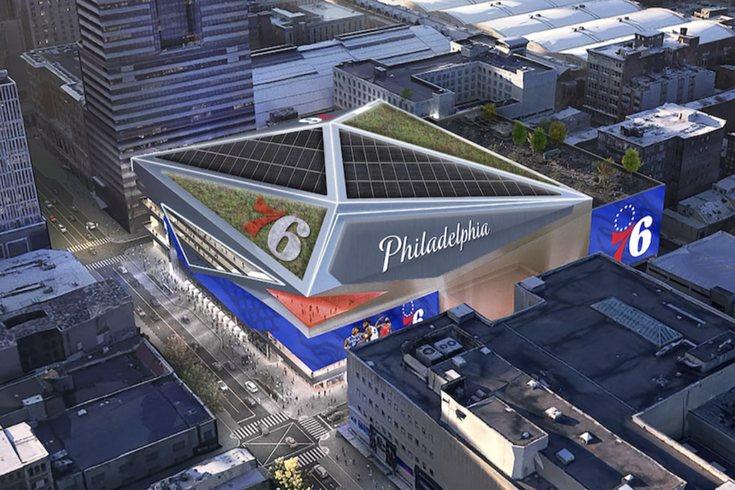
March 16, 2023
 PHILADELPHIA 76ERS/76PLACE.COM
PHILADELPHIA 76ERS/76PLACE.COM
76 Place at Market East, the downtown arena proposed by the Philadelphia 76ers, would be at the southern edge of Chinatown between 10th and 11th streets. Local community groups have been vocal in their opposition to the team's plan since it was announced last summer.
The Philadelphia Chinatown Development Corp. joined other neighborhood organizations on Thursday to formally oppose the 76ers' Market Street arena proposal, warning that the team's plan "deeply imperils the future" of the community that would live in its shadow.
The PCDC said its position is based on research and the opinions of Chinatown residents, business leaders and others, which were collected at community meetings and by survey, 230 of which were completed. What PCDC found underscores the extent of opposition among people in the community to the Sixers' arena plan, the organization said.
According to PCDC's data, 93% of business owners, 94% of residents and 95% of Chinatown visitors oppose the arena. The top concerns expressed by survey takers are cultural deterioration, parking and traffic, and increasing rents and displacement.
"Research shows that urban arenas have negative to no impact on the local economy and destroy authentic community life," PCDC officials said in a statement posted on Facebook. The group cites several academic studies (like ones here, here and here) to support its position that arenas lead to the gentrification of communities and the displacement of current residents.
"Stadiums have had a gentrifying impact on low-income communities of color across the country – in Los Angeles, Seattle, New York City, Atlanta and the list goes on." PCDC said. "The Capital One arena in Washington, D.C. contributed to the demise of the city's Chinatown. We will not allow Philadelphia Chinatown to be another one of these tragic stories."
The non-profit PCDC, founded in 1966, has long been an advocate for affordable housing in Chinatown and the cultural and economic development of the neighborhood's commercial corridor. The organization is influential in city-led planning initiatives, including the recently announced Chinatown Stitch program that could result in a cap being constructed over the Vine Street Expressway in an effort to reconnect the neighborhood's north and south ends. PCDC also provides social services and programs that help residents overcome language barriers.
Last summer, when the 76ers unveiled plans to build the privately-funded, $1.3 billion 76 Place at Market East, PCDC formed a committee to study the plan. The arena is proposed between 10th and 11th streets and from Market Street north to Cuthbert Street, which is the southern end of Chinatown. Construction of the arena would involve the demolition of a portion of the Fashion District Philadelphia mall and a Greyhound bus station.
76 Devcorp, the developer behind the proposal, has described the plan as a much-needed infusion of commercial investment in the East Market Street corridor. The team and others receptive to the downtown stadium contend that the area is stagnant and underutilized despite its location above the major public transit of hub of Jefferson Station. And 76 Devcorp has pledged $50 million as part of a community benefits agreement that would be invested in the neighborhoods surrounding Market East, including Chinatown.
"It's disappointing when Market East is in the midst of economic decline and after our attempts to work with PCDC that they would reach this decision without seeing our official proposal," Nicole Gainer, spokesperson for 76 Devcorp, said Thursday. "Our investment will include one of the largest community benefits agreements in the history of our city and country. In recent weeks, stakeholders continue to come out in support of this privately-funded project at this critical time for our city. We remain committed to developing this project in a way that protects the city we love and benefits all of Philadelphia."
Earlier this month, 76 Devcorp countered the argument that downtown arenas aren't beneficial to cities, noting there have been economic success stories in Detroit, Milwaukee, Los Angeles, Sacramento and elsewhere.
The developers have shown some impatience with the hyperlocal focus of the conversation around 76 Place at Market East, tweeting earlier this month that "misinformation campaigns" are obscuring the big picture benefit to Philadelphia.
Let's be clear: 76 Place will benefit ALL Philadelphians.
— 76Place (@76Place) March 3, 2023
We'll improve transit, create thousands of union jobs, revitalize Market East, make our city safer, and work with community groups to invest in underserved communities.
Learn more: https://t.co/o292mPxyVi pic.twitter.com/ZkS4qibAdS
Major unions, including the Philadelphia Building & Construction Trades Council and the Eastern Atlantic States Regional Council of Carpenters, lately have voiced support for the arena and the 9,000 construction-related jobs the developer says it would bring to Center City.
76 Devcorp hopes to begin building in 2027, with a targeted completion in 2031. The Sixers had an ambitious timeline to obtain necessary approvals from the city by the summer. That has since been pushed to the fall. Philadelphia will elect a new mayor and multiple new members of City Council this year, adding an increasingly political dimension to decisions around the arena.
PCDC's position reinforces what other neighborhood groups, including the recently formed Chinatown Coalition to Oppose the Arena, have already said about the 76ers arena.
Another frequent objection to the new stadium has been that the 76ers already have a viable home at the Wells Fargo Center in South Philly, where the team leases the arena from owner Comcast Spectator. Critics feel the overriding motivation of the 76ers ownership is to profit more from an arena of its own, which makes people in Chinatown skeptical that the neighborhood's interests will be protected by the team's owners.
To date, in addition to holding more than 30 meetings with community members and stakeholders, 76 Devcorp says it has shared an outline of the arena proposal's various phases and offered a number of ideas that could be part of a community investment plan in Chinatown.
The team has suggested it could support land acquisition for affordable housing development, make funds available for down payment assistance, subsidize existing affordable homes and partner with the city on other solutions to promote affordability for residents.
"We will be presenting our proposal once we have completed listening, studying, and working with the community to develop a proposal that benefits everyone," Gainer said. "At the moment this work is ongoing."